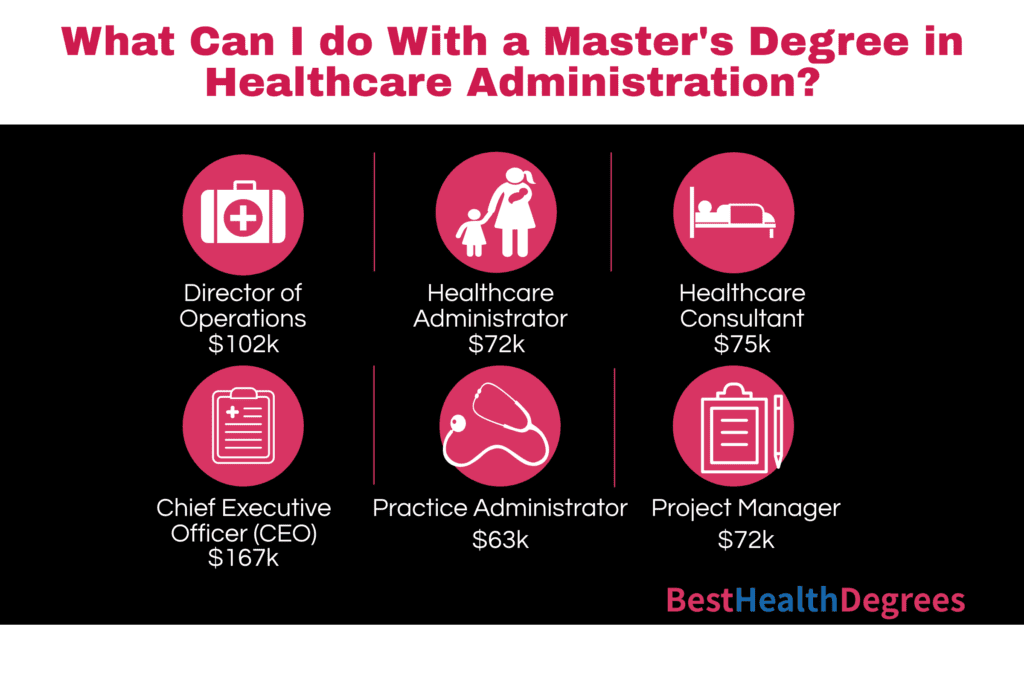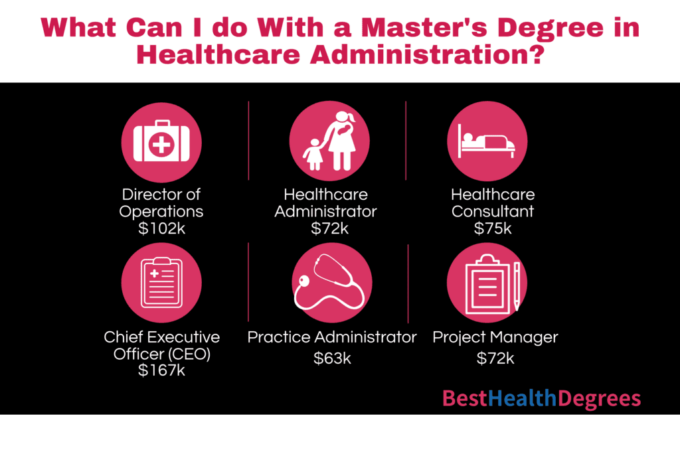
Degree Programs
Master’s programs in Health Care Administration equip professionals with the knowledge and skills necessary to lead and manage healthcare organizations effectively. These programs typically offer a comprehensive curriculum that covers core areas such as healthcare finance, operations management, strategic planning, and healthcare policy.
The duration of a Master’s in Health Care Administration program typically ranges from 12 to 24 months, depending on the program format and the student’s pace of study. Full-time programs generally take around 12 to 18 months to complete, while part-time programs may take longer.
Career Prospects
Graduates with a Master’s in Health Care Administration have a wide range of career opportunities in various healthcare settings. They can pursue roles such as:
- Healthcare Administrator
- Hospital Manager
- Nursing Home Administrator
- Healthcare Consultant
- Health Insurance Executive
Certifications and Specializations
Many Master’s in Health Care Administration programs offer certifications and specializations that allow students to focus on specific areas of healthcare management. Some common certifications and specializations include:
- Certified Healthcare Executive (CHE)
- Certified Medical Practice Executive (CMPE)
- Certified Healthcare Financial Professional (CHFP)
- Healthcare Management and Leadership Specialization
- Healthcare Informatics Specialization
Coursework
Masters in Healthcare Administration programs provide a comprehensive curriculum designed to equip graduates with the knowledge and skills necessary to lead and manage healthcare organizations effectively. The coursework typically includes a combination of core courses and specialized courses.
Core courses provide a foundational understanding of healthcare management, finance, and operations. These courses cover topics such as healthcare systems, healthcare economics, financial management, and operations management. By mastering these core concepts, students gain a solid foundation for making informed decisions and managing healthcare organizations efficiently.
Specialized Courses
In addition to core courses, Master’s programs also offer specialized courses that allow students to develop expertise in specific areas of healthcare management. These courses may include topics such as:
- Healthcare Policy: Examines the development and implementation of healthcare policies, including their impact on healthcare organizations and patient care.
- Data Analytics: Focuses on the use of data to improve healthcare decision-making, including data collection, analysis, and interpretation.
- Leadership: Develops leadership skills essential for managing healthcare organizations, including communication, conflict resolution, and team building.
Skills and Competencies
Masters in Health Care Administration (MHA) programs cultivate a range of essential skills and competencies crucial for effective healthcare management. Graduates develop a solid foundation in analytical thinking, problem-solving, and communication, which are indispensable in navigating the complex healthcare landscape.
Analytical and Problem-Solving Skills
MHA programs equip students with robust analytical and problem-solving abilities. They learn to gather, interpret, and synthesize data to identify healthcare issues and develop evidence-based solutions. These skills are essential for addressing healthcare challenges, such as optimizing patient outcomes, managing resources efficiently, and improving operational processes.
Communication Skills
Effective communication is paramount in healthcare management. MHA programs emphasize the development of strong verbal and written communication skills. Graduates can clearly articulate complex healthcare concepts to diverse audiences, including patients, healthcare professionals, and policymakers. They are also adept at fostering collaboration and building consensus among stakeholders.
Leadership and Strategic Thinking
Leadership and strategic thinking are central to the role of healthcare administrators. MHA programs provide opportunities for students to develop these abilities through case studies, simulations, and real-world projects. Graduates learn to lead teams, inspire innovation, and develop long-term strategies that align with the organization’s mission and goals.
Career Opportunities
Graduates with Master’s in Healthcare Administration (MHA) degrees possess a comprehensive understanding of healthcare systems, management principles, and policy analysis, making them highly sought after in various healthcare organizations. The MHA degree equips individuals with the skills and knowledge to excel in leadership and management roles within the healthcare industry.
MHA graduates can pursue a wide range of career opportunities, including hospital administrators, health policy analysts, and healthcare consultants. These roles involve responsibilities such as managing healthcare facilities, developing and implementing health policies, and advising healthcare organizations on operational and strategic matters.
Hospital Administrators
Hospital administrators oversee the day-to-day operations of hospitals and healthcare systems. They are responsible for managing budgets, staffing, and patient care services. Hospital administrators also work closely with physicians and other healthcare professionals to ensure the delivery of high-quality patient care.
Health Policy Analysts
Health policy analysts conduct research and analysis to inform the development and implementation of health policies. They work with government agencies, healthcare organizations, and advocacy groups to assess the impact of health policies on patients, providers, and the healthcare system as a whole.
Healthcare Consultants
Healthcare consultants provide advice and guidance to healthcare organizations on a wide range of issues, including operational efficiency, strategic planning, and financial management. They work with clients to identify and address challenges, develop solutions, and improve overall performance.
Accreditation and Recognition

Accreditation plays a pivotal role in the realm of Masters Health Care Administration programs, signifying the quality and rigor of the curriculum. Reputable accrediting bodies, such as the Commission on Accreditation of Healthcare Management Education (CAHME), establish stringent standards that ensure programs meet industry benchmarks.
Accrediting Bodies and Standards
* Commission on Accreditation of Healthcare Management Education (CAHME): CAHME is the gold standard for accreditation, ensuring programs align with industry best practices and prepare graduates for leadership roles in healthcare management.
* Accreditation Council for Business Schools and Programs (ACBSP): ACBSP focuses on the business aspects of healthcare administration, accrediting programs that provide a strong foundation in finance, marketing, and operations.
* International Assembly for Collegiate Business Education (IACBE): IACBE evaluates programs based on their curriculum, faculty qualifications, and student outcomes, ensuring they meet international standards.
Program Structure and Delivery
Master’s in Healthcare Administration programs offer various delivery options to accommodate the diverse needs of students. Understanding the advantages and disadvantages of each delivery method is crucial to making an informed decision.
Program Structures
Full-time Programs: Designed for students who can dedicate a significant portion of their time to their studies. These programs typically take 1-2 years to complete and involve intensive coursework, often with internships or practicums.
Part-time Programs: Cater to students with work or family commitments who prefer a more flexible schedule. Part-time programs usually take 2-4 years to complete, allowing students to balance their studies with other responsibilities.
Online Programs: Provide flexibility and accessibility for students who may live in remote areas or have demanding schedules. Online programs utilize virtual learning platforms and often offer asynchronous coursework, allowing students to study at their own pace.
Advantages and Disadvantages
Full-time Programs:
Advantages:
– Intensive learning experience with dedicated focus on studies
– Accelerated completion timeline
– Strong camaraderie and networking opportunities
Disadvantages:
– Less flexibility and work-life balance
– Higher financial commitment
Part-time Programs:
Advantages:
– Greater flexibility and work-life balance
– Opportunity to gain work experience while studying
– Lower financial burden
Disadvantages:
– Extended completion timeline
– Potentially less immersive learning experience
Online Programs:
Advantages:
– Flexibility and accessibility
– Reduced commuting time and costs
– Global reach and access to experts
Disadvantages:
– Less face-to-face interaction with instructors and peers
– Potential for isolation or lack of motivation
– Technical challenges
Flexibility and Accessibility
Flexibility and accessibility are essential considerations in Masters Health Care Administration programs. Full-time programs offer a more structured and intensive learning experience, while part-time and online programs provide greater flexibility for students with other commitments. Online programs, in particular, expand access to education for individuals in remote areas or with limited time availability.
Research and Innovation
Masters in Health Care Administration programs offer students the opportunity to engage in cutting-edge research that drives innovation in healthcare management. By actively participating in research projects, students gain invaluable hands-on experience, develop critical thinking skills, and contribute to the advancement of the field.
Research in health care administration plays a crucial role in improving healthcare practices and outcomes. Through rigorous studies and analysis, researchers identify areas for improvement, develop evidence-based interventions, and evaluate the effectiveness of existing strategies. This ongoing research ensures that healthcare professionals stay abreast of the latest advancements and provide the best possible care to patients.
Potential for Graduates
Graduates of Masters Health Care Administration programs are well-equipped to contribute to the field through research and innovation. With their advanced analytical skills and knowledge of healthcare systems, they can lead research initiatives, develop innovative solutions to healthcare challenges, and translate research findings into practice. Their contributions have the potential to shape the future of healthcare management and improve the lives of patients worldwide.





